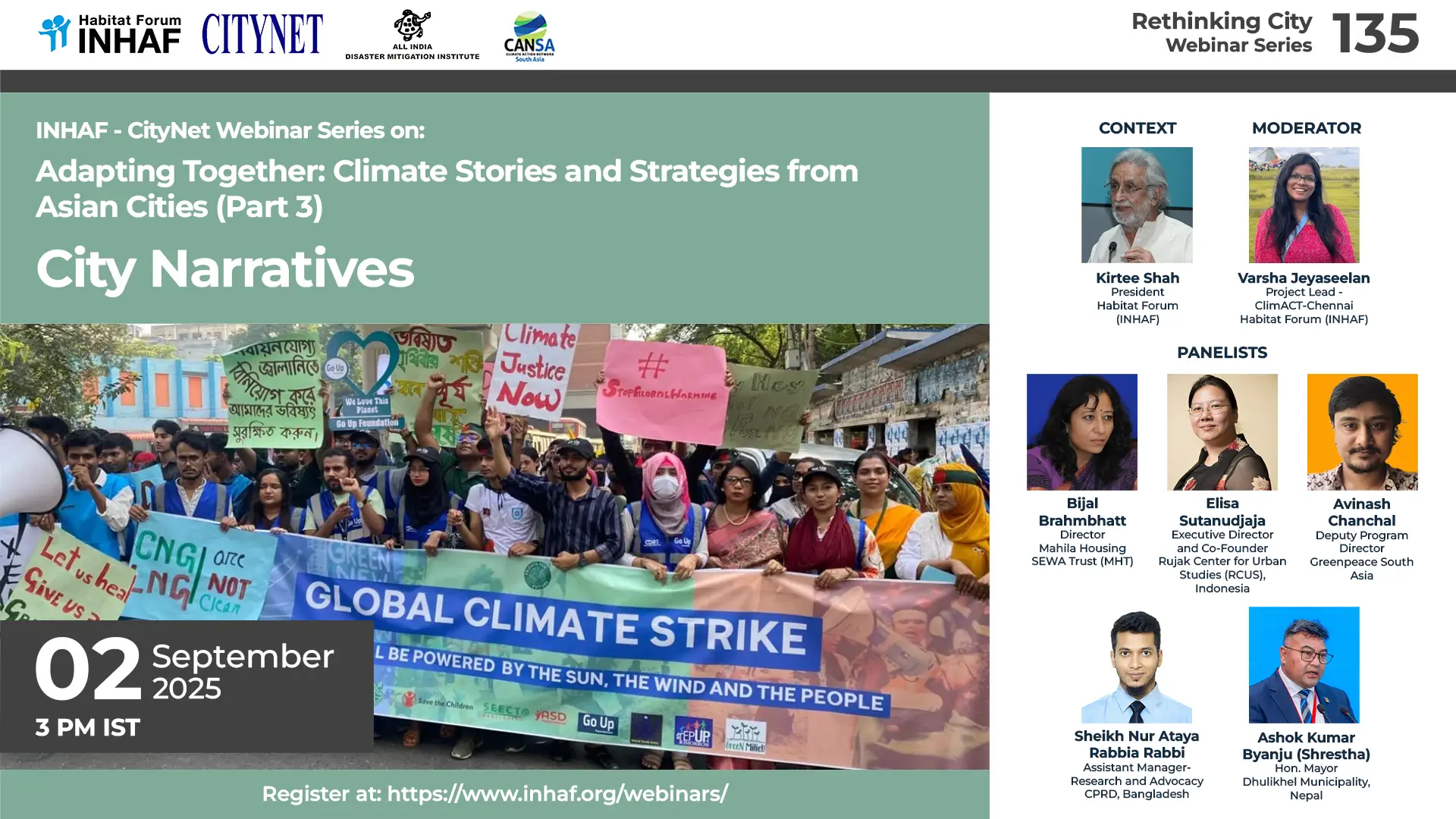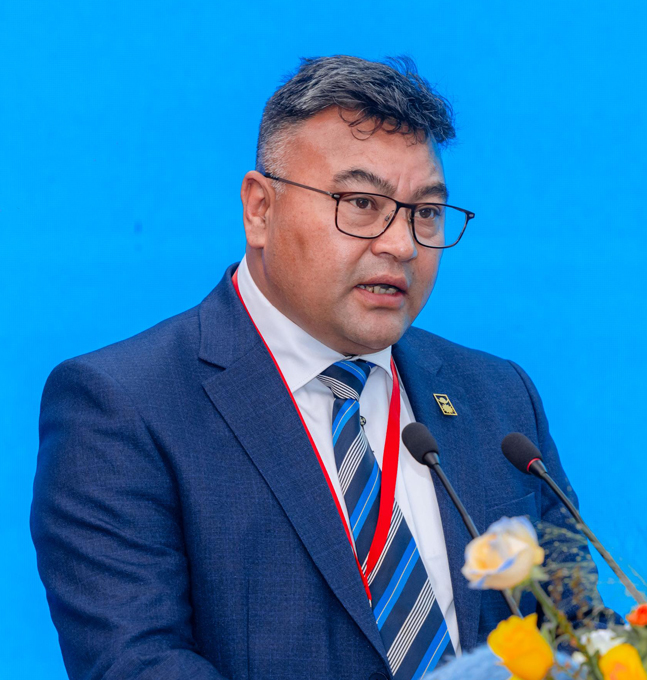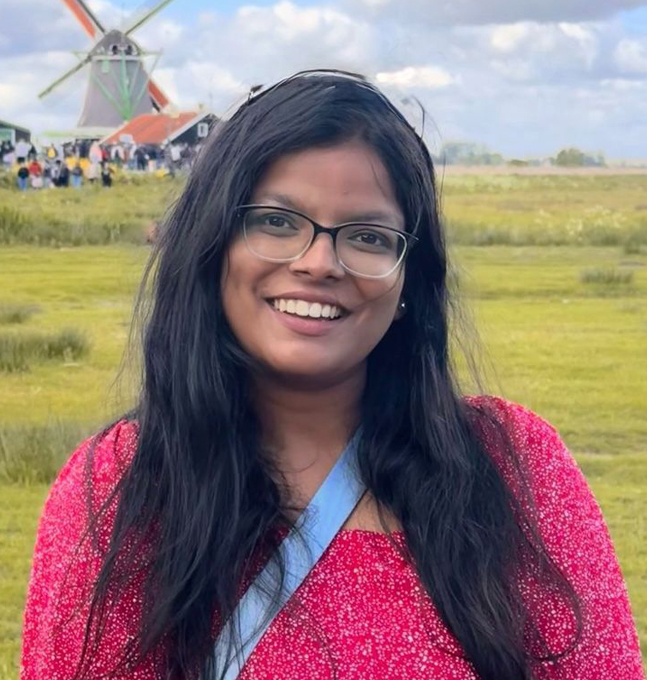
Speakers
-
 Ashok Kumar ByanjuHon. Mayor for Dhulikhel Municipality, Nepal
Ashok Kumar ByanjuHon. Mayor for Dhulikhel Municipality, NepalAshok Kumar Byanju is the Mayor of Dhulikhel Municipality, a role in which he has focused on sustainable urban development and enhancing public services in Dhulikhel, a historic and rapidly growing town in Nepal. Byanju has actively promoted Dhulikhel as a hub for tourism, education, and healthcare, while also working to improve local infrastructure. He is known for his leadership in implementing innovative municipal projects, particularly in waste management and environmental sustainability.
Additionally, Byanju has played a significant role in advocating for local governance and decentralization, often representing Nepali municipalities in international forums. His work emphasizes the importance of strengthening local governments to foster development at the grassroots level. -
 Avinash ChanchalDeputy Program Director, Greenpeace South Asia
Avinash ChanchalDeputy Program Director, Greenpeace South AsiaAvinash Chanchal is an environmental and climate justice campaigner with over a decade of experience in advocacy, currently serving as Deputy Program Director at Greenpeace South Asia. He leads regional campaigns on climate justice, urban equity, and ocean protection, building on his earlier work at Greenpeace India on air quality, sustainable mobility, and climate resilience. With a background in journalism and as the author of Singrauli Files, Avinash combines storytelling with activism to highlight the human and environmental costs of industrial pollution. He coordinates the Workers’ Collective for Climate Justice: South Asia, co-founded the Public Transport Forum in Delhi, and serves on the Steering Committee of the Mineral Inheritors Rights Association (MIRA). A strong advocate for inclusive and sustainable solutions, he works with communities, researchers, and policymakers to ensure climate action centers on vulnerable and marginalized groups.
-
 Bijal BrahmbhattDirector, Mahila Housing SEWA Trust (MHT)
Bijal BrahmbhattDirector, Mahila Housing SEWA Trust (MHT)Bijal Brahmbhatt is currently the Director of Mahila Housing SEWA Trust (MHT). Bijal has extensive experience in, and broad knowledge of intersectional challenges that are mediated through housing and habitat, governance (lack there-of), informality, and gender for low-income urban communities and migrants in cities. She represents and advocates for the rights to improve living conditions, foster climate resilience and overall economic security, through socio-technical approaches and women-led models, never to miss important opportunities, advocate across multiple scales, and break silos.
Her work of over 20 years in cities can be best summed up to be in the areas of formal, informal, and invisible governance for housing and habitat—an amalgam of individual/ household/ community and city-level activities; strategies through which women can seek public goods and services central to their well-being; voice and agency essential for making claims on the state and spaces for participation (social capital), all of which happen outside of the gaze of formalized governance arrangements. Her programmes have helped women participate in city-level initiatives, a small step to make cities inclusive. She constantly engages with markets for pro-poor solutions, and with policymakers to solicit not just marginal improvements but driving system-level changes.
Bijal is a Fellow (2015) of the Womanity Foundation, Switzerland; a finalist of Schwab Foundation’s Social Entrepreneur of the year, India. She was awarded the Surya Mitra National Award for creating sustainable energy assets for equitable access in Urban Areas by the Selco Foundation.
She is a member of the InsuResilience Gender Working Group of the InsuResilience Global Partnership which works towards gender-sensitive Climate and Disaster Risk Finance and Insurance solutions and she has contributed to the InsuResilience Global Partnership Declaration on Gender.
Bijal holds a degree in Civil Engineering and has a certificate in Urban Planning and Management, from the Institute of Housing Studies, Netherlands. -
 Elisa SutanudjajaExecutive Director & Co-Founder, Rujak Center for Urban Studies (RCUS), Jakarta, Indonesia
Elisa SutanudjajaExecutive Director & Co-Founder, Rujak Center for Urban Studies (RCUS), Jakarta, IndonesiaElisa Sutanudjaja is the Executive Director and co-founder of the Rujak Center for Urban Studies (RCUS) in Jakarta, Indonesia, an institution established in 2010 to foster ecological transitions through community-grounded urban knowledge and practices. Trained in architecture at Universitas Tarumanagara and the University of New South Wales, she has also been a JENESYS Fellow in Education for Sustainable Development and an Eisenhower Fellow in 2013, focusing on technologies for public participation in urban planning. Since 2009, she has coordinated the Citizen Coalition for Jakarta 2030, advocating for more inclusive participation in the city’s planning processes. Her leadership at RCUS has emphasized the role of citizens as central agents of sustainable urban change, bridging lived experiences and collaborative governance. Elisa has been deeply engaged in projects such as the Kampung Susun Akuarium housing initiative, which won the Asia Pacific Housing Innovation Award in 2023 for its co-designed, human-rights-based model. She has also contributed to climate justice research through the CLICCC project, documenting community-led perspectives on loss and damage from climate impacts. Beyond research and advocacy, she is a strong public voice on urban governance, often critiquing projects that lack transparency or public involvement, such as the Monas revitalization, coastal land rights in Tangerang, and safety concerns around the Pertamina fuel depot in Plumpang. Her work also extends into cultural and urban art engagements, curating initiatives like “Archiving Resistance” and “Ziarah Utara Jakarta,” which reimagine Jakarta’s urban and coastal spaces through activism, art, and critical reflection. Through this diverse body of work, Elisa continues to push for inclusive, sustainable, and citizen-centric urban futures in Indonesia.
-
 Sheikh Nur Ataya RabbiAssistant Manager- Research and Advocacy, Center for Participatory Research and Development (CPRD), Bangladesh
Sheikh Nur Ataya RabbiAssistant Manager- Research and Advocacy, Center for Participatory Research and Development (CPRD), BangladeshSheikh Nur Ataya Rabbi is working for CPRD as Assistant Manager- Research and Advocacy. He is an accomplished economics graduate with a bachelor’s and master’s degree from Comilla University. With a strong analytical background and a keen interest in economic and development theories and policy analysis, Mr. Rabbi specializes in conducting in-depth research on macroeconomic trends and their impacts on the economy, climate change impacts, and climate change and development nexus. His expertise lies in qualitative and quantitative research methods, data analysis, econometric modelling, and the synthesis of complex information into actionable insights. He is conversant with the international climate change negotiation process and the national and international policy landscape on climate change.
Rabbi has conducted extensive ground research on micro and macroeconomic and development issues, climate change adaptation, mitigation, loss and damage, and climate finance. He has collaborated in developing several policy and position papers, contributing to impacting policy development and strategic decision-making, addressing critical economic and environmental challenges and promoting sustainable development. He has a notable publication record on diverse issues of climate change, environmental, and development economics, such as, climate change mitigation, adaptation, loss and damage, human rights, displacement and migration, climate negotiation, in national and international peer-reviewed journals. With his attention to detail and commitment to excellence, Mr. Rabbi is passionate for becoming a thought leader in the arena of development research and climate advocacy. -
 Varsha JeyaseelanProject Lead - ClimACT-Chennai, INHAF
Varsha JeyaseelanProject Lead - ClimACT-Chennai, INHAFVarsha Mini Veronica Jeyaseelan is Project Lead for Climate Studies and Research at Habitat Forum (INHAF). An architect and urban researcher, she works at the intersection of climate resilience, spatial planning, and socio-environmental justice, leading research that informs policy and drives community-led adaptation strategies for inclusive and resilient cities.
Local Time
- Timezone: America/New_York
- Date: Sep 02 2025
- Time: 5:30 am
Adapting Together: Climate Stories and Strategies from Asian Cities (Part III) – City Narratives
About the Webinar Series – Adapting Together: Climate Stories and Strategies from Asian Cities
Habitat Forum (INHAF), a civil society organization and CityNet member from India in collaboration with CityNet, AIDMI, CANSA, is launching a new initiative: a 5-part webinar series on Cities and Climate Change. The series is intended for all those engaged in the field of Urban Development, with the goal of responding to the unique and growing challenges posed by climate change. These challenges call for a rethinking of existing urban systems, practices, and governance mechanisms.
Cities all over the world are being battered by climate impacts such as extreme rainfall and consequent urban flooding. Since Cities contribute around 63% of nations’ GDPs, climate impacts are leading to heavy and repetitive damage and costs. Urban heat islands are posing mounting problems for livability, while spurring calls for increasing blue-green infrastructure in contexts of competing land use. Droughts and wasteful consumption have created crises in water supply in many parts of the world. Several Cities, including among CityNet members are striving to evolve, and implement coping mechanisms while also building systems to create long term resilience to these and other climate impacts.
The world as a whole, and individual nations, are also grappling with the need to reduce greenhouse gas emissions so as to check global warming that drives climate impacts. Besides national targets under the Paris Agreement, sub-national governments, especially Cities, are also being called upon to shoulder a substantial part of the emissions reduction burden, since Cities contribute about 70% of emissions. Cities are approaching these challenges in different ways and could learn a lot from each other about perspectives and practices.
Webinar 3: City Narratives
The Webinar looks at perspectives of climate change from the vantage of urban vulnerable populations — women, children, youth, informal settlements and unorganized workers among others. Speakers would present case studies, and experiences and challenges in adaptation actions and building resilience such that vulnerabilities and i es are redressed, and lower-income groups are not further burdened with mitigating responsibilities. Presentations would also highlight contributions of the private and civil society sectors to climate work, highlighting innovations, participation and impact.
